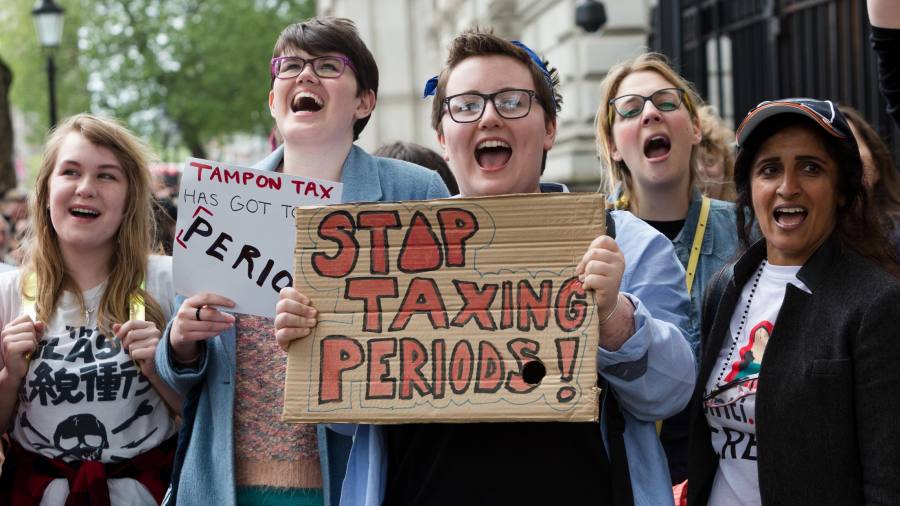
Most of the savings from the UK scrapping its “tampon tax” on women’s sanitary products has been kept by businesses, a report has found, prompting calls for better use of taxation to protect consumers.
At most, the price of sanitary products fell 1 per cent after the removal of a 5 per cent VAT on these items in January 2021, according to an analysis of Office for National Statistics data by the Tax Policy Associates think-tank.
The findings, released on Thursday, have raised questions over whether tax cuts are the best way to protect consumers from rising prices as the cost of living crisis deepens.
“The remaining 80 per cent of the benefit [of removing VAT has been] retained by retailers and or suppliers. More likely, the retailers and or suppliers took all the benefit — amounting to £15mn each year,” the report said.
The UK scrapped its so-called tampon tax at the end of the Brexit transition period — the EU had required member states to tax tampons and sanitary towels at a minimum of 5 per cent. Brussels dropped this requirement in April this year.
Women’s rights activists have for years argued that taxing menstrual hygiene products, whose use is essential, places an unfair burden on women, especially those who may struggle to afford them.
Since 2015, the £15mn raised by the UK’s tampon tax each year had been ringfenced for spending directly on charities that help women.
Some policymakers have advocated tax cuts on certain products and services, such as hospitality and fuel, to help stimulate spending over the Covid-19 pandemic and to alleviate cost of living pressures.
But the report said that policymakers “should be sceptical of those making proposals for cuts in VAT and duties, particularly if claims are made that this will benefit consumers, and or those on low incomes”.
“If we want to support those who can’t afford to pay, then the answer is to put cash directly in their hands (through the tax and benefits system), or in some cases (perhaps such as this) provide free or subsidised products,” it continued.
Rita de La Feria, a professor of tax law at Leeds university, said the extent to which savings from VAT cuts are passed on to customers depended on the product’s price sensitivity, political pressure and the nature of the business, among other factors.
De La Feria suggested the government should expand the range of products on which VAT is applied as a way of raising tax revenue.
“How can we protect the poor in a better, more targeted way? Rather than [have] a reduced rate which protects retailers or benefits the top of income distribution more?” she asked.
The UK slashed VAT for the hospitality sector in 2020 but this has since returned to 20 per cent. Former chancellor Kwasi Kwarteng’s plan to allow VAT-free shopping for foreign tourists was scrapped by current chancellor Jeremy Hunt.
Margaret Hodge MP, chair of the parliamentary group on responsible tax, said: “It beggars belief that in the midst of a cost of living crisis miserly retailers and global multinationals are choosing to hoard tax savings on sanitary products.”
The government said: “We have kept our promise to scrap the tampon tax to make sanitary products more affordable and urge retailers to pass the savings on to shoppers.”